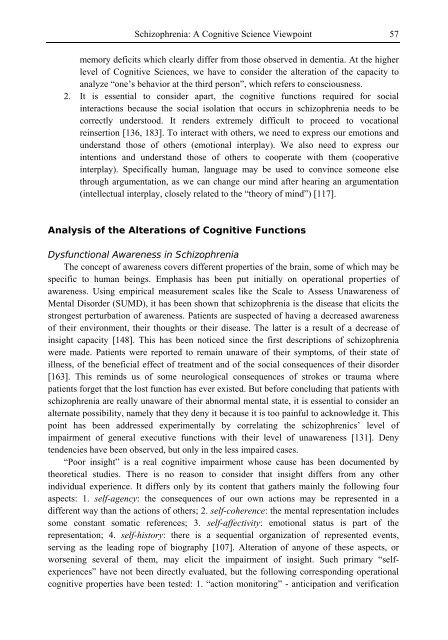Schizophrenia Research Trends
Schizophrenia Research Trends
Schizophrenia Research Trends
- No tags were found...
Create successful ePaper yourself
Turn your PDF publications into a flip-book with our unique Google optimized e-Paper software.
<strong>Schizophrenia</strong>: A Cognitive Science Viewpoint 57memory deficits which clearly differ from those observed in dementia. At the higherlevel of Cognitive Sciences, we have to consider the alteration of the capacity toanalyze “one’s behavior at the third person”, which refers to consciousness.2. It is essential to consider apart, the cognitive functions required for socialinteractions because the social isolation that occurs in schizophrenia needs to becorrectly understood. It renders extremely difficult to proceed to vocationalreinsertion [136, 183]. To interact with others, we need to express our emotions andunderstand those of others (emotional interplay). We also need to express ourintentions and understand those of others to cooperate with them (cooperativeinterplay). Specifically human, language may be used to convince someone elsethrough argumentation, as we can change our mind after hearing an argumentation(intellectual interplay, closely related to the “theory of mind”) [117].Analysis of the Alterations of Cognitive FunctionsDysfunctional Awareness in <strong>Schizophrenia</strong>The concept of awareness covers different properties of the brain, some of which may bespecific to human beings. Emphasis has been put initially on operational properties ofawareness. Using empirical measurement scales like the Scale to Assess Unawareness ofMental Disorder (SUMD), it has been shown that schizophrenia is the disease that elicits thestrongest perturbation of awareness. Patients are suspected of having a decreased awarenessof their environment, their thoughts or their disease. The latter is a result of a decrease ofinsight capacity [148]. This has been noticed since the first descriptions of schizophreniawere made. Patients were reported to remain unaware of their symptoms, of their state ofillness, of the beneficial effect of treatment and of the social consequences of their disorder[163]. This reminds us of some neurological consequences of strokes or trauma wherepatients forget that the lost function has ever existed. But before concluding that patients withschizophrenia are really unaware of their abnormal mental state, it is essential to consider analternate possibility, namely that they deny it because it is too painful to acknowledge it. Thispoint has been addressed experimentally by correlating the schizophrenics’ level ofimpairment of general executive functions with their level of unawareness [131]. Denytendencies have been observed, but only in the less impaired cases.“Poor insight” is a real cognitive impairment whose cause has been documented bytheoretical studies. There is no reason to consider that insight differs from any otherindividual experience. It differs only by its content that gathers mainly the following fouraspects: 1. self-agency: the consequences of our own actions may be represented in adifferent way than the actions of others; 2. self-coherence: the mental representation includessome constant somatic references; 3. self-affectivity: emotional status is part of therepresentation; 4. self-history: there is a sequential organization of represented events,serving as the leading rope of biography [107]. Alteration of anyone of these aspects, orworsening several of them, may elicit the impairment of insight. Such primary “selfexperiences”have not been directly evaluated, but the following corresponding operationalcognitive properties have been tested: 1. “action monitoring” - anticipation and verification
















